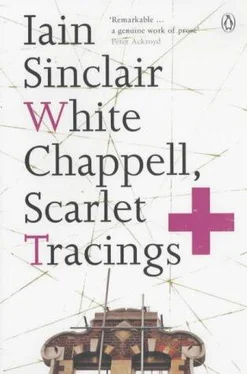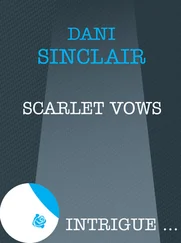Iain Sinclair - White Chappell, Scarlet Tracings
Здесь есть возможность читать онлайн «Iain Sinclair - White Chappell, Scarlet Tracings» весь текст электронной книги совершенно бесплатно (целиком полную версию без сокращений). В некоторых случаях можно слушать аудио, скачать через торрент в формате fb2 и присутствует краткое содержание. Год выпуска: 2004, Издательство: Penguin Books Ltd, Жанр: Современная проза, на английском языке. Описание произведения, (предисловие) а так же отзывы посетителей доступны на портале библиотеки ЛибКат.
- Название:White Chappell, Scarlet Tracings
- Автор:
- Издательство:Penguin Books Ltd
- Жанр:
- Год:2004
- ISBN:нет данных
- Рейтинг книги:4 / 5. Голосов: 1
-
Избранное:Добавить в избранное
- Отзывы:
-
Ваша оценка:
- 80
- 1
- 2
- 3
- 4
- 5
White Chappell, Scarlet Tracings: краткое содержание, описание и аннотация
Предлагаем к чтению аннотацию, описание, краткое содержание или предисловие (зависит от того, что написал сам автор книги «White Chappell, Scarlet Tracings»). Если вы не нашли необходимую информацию о книге — напишите в комментариях, мы постараемся отыскать её.
"In this extraordinary work Sinclair combines a spiritual inquest into the Whitechapel Ripper murders and the dark side of the late Victorian imagination with a posse of seedy book dealers hot on the trail of obscure rarities of that period. These ruined and ruthless dandies appear and disappear through a phantasmagoria interspersed with occult conjurings and reflections on the nature of fiction and history"
White Chappell, Scarlet Tracings — читать онлайн бесплатно полную книгу (весь текст) целиком
Ниже представлен текст книги, разбитый по страницам. Система сохранения места последней прочитанной страницы, позволяет с удобством читать онлайн бесплатно книгу «White Chappell, Scarlet Tracings», без необходимости каждый раз заново искать на чём Вы остановились. Поставьте закладку, и сможете в любой момент перейти на страницу, на которой закончили чтение.
Интервал:
Закладка:
It was the time of the Ghost Dance. Mahdi. Messianic spasms. He saw the verges. John Wilson, Moonhead: God’s Son returns to us, coming out from old man Coyote. The trodden circle of the dance. Swallows itself. The dream. He put on a white shirt. The man returns from death, with gifts; towards this city. Heart stopped.
They questioned the Plains Indians that Colonel Cody brought over to the Tenter Ground for his Wild West Show. They were implicated, suspect; sitting on their heels outside the flapping hill of canvas, smoking.
The great synthesis travels in a sealed cab. Stars move across the pitched ceiling. A coracle. They tell of a love that is beyond heat. Jupiter combined with darkness and a piece of the moon.
But ours is the restaurant that is shunned: it is tainted by journalism. Hot lies creep onto the plate. Cockroaches slither down the flock. Let us eat the spiced meats, the saffron rice. Let us take wine. Corrupted music emerges through the distortion of fault as something new.
The girl is persuaded to dance for us, privately; the doors are locked, the shutters drawn.
By carriage across Whitechapel Road and into Brady Street, west, between the Jews’ Burial Ground and the Station; skirt the Workhouse; Bakers Row and into Hanbury Street, south now: the moon cuckolded on the great church tower.
In the room Treves holds consultation, mixing authority with humour. Merrick is carried up and placed in a heavily cushioned, rug covered, cane-chair. Treves: his back to the window. The coachman, settled in the frame of the door, ushers in the women: the old one and the girl.
Merrick half-rises; the left hand, gloved, held out. A bubble of address gobs his throat: mucoid leer. Is he here as witness or participant? Oilcloth across the window. Cobbles in the street. Men wrestling over a bottle, a mud dance; keeping it, delicately, between them, keeping their balance; over the kerb, into the gutter. A head wound opens slowly into a mouth: blood-soaked hair. Fire in the market.
Around the brazier, vegetable refuse is burnt; torn with palsied hands, crammed in the mouth. Teeth stumps champing and gumming the shells. Waste-water boiling in the can. The bottle passing between the window and the moon.
‘I was awakened by a kitten walking across my neck, and just then I heard screams of murder about two or three times in a female voice.’
From above it is a feast: of feathers, wounds, feet on earth. The century snake dying. White clouds boiling slow, a cauliflower scum. Ragstone watching its history evaporate under a gun of steam. The doctor with a womb in his bag. Two men and a woman crossing the Lane towards the lights of a restaurant.
Gloved hand sealing the window. The howl of a dog in an empty courtyard. Her linsey skirt unbells. The banner of bleeding meat. The moment of the sweating room. I heard a voice singing. Widows and unfortunates. No light; all’s quiet.
It is Strange Case of Dr Jekyll & Mr Hyde , written by Stevenson, after a series of hideous nightmares; received and transmitted by those tuned to accept the scalding stream of images that both mask and reveal his appalling message.
Treves was determined to reverse this process. He had found his Caliban, his Hyde, his natural man: needed now to absorb him, to give fire to his own nature, to the hidden being within — swimming back out of the mirror of deformity into the urbane and politic surgeon. To reclaim the aboriginal, the green; the skin of fruits and scales, the mineral cloak. To manifest his true consciousness. To script that journey within the boundaries of expectation.
When she is naked and glistens, rubbed with oil, garlanded, her skin now darker, they bring out the mask, the great Elephant’s Head of Ganesa. So she sways, she lifts her arms, so she rolls the massive helmet of wood. She threatens the moon with her tusk: the tusk that was broken off to take the dictation of the gods. Now it spears Joblard’s side.
‘Bugger your Sufi dancing — I’ll learn the tango!’
We are in an upper room; the moon, the brewery clock, the tower of the church. His face shone. He rubbed down the matted hair of his body, he rubbed himself with oil. He appeared like a bridegroom.
Now the tusked head is on a hook. They are lying upon a couch. The window is the mirror that I block out.
The squatting strangers heat the ganja : leading us into a further nightmare.
I felt a cold breath at my ear, and a voice whose inflections were most familiar, although I could not identify its source, said, ‘This wretch, who sold his legs for drink, has stolen your head and replaced it, not with an ass’s head, but with an elephant’s head.’
Utterly bewildered, I went directly to the mirror. I might have been mistaken for a Hindu or a Javanese idol: my brow had risen, my nose, grown to a trunk, drooped to my chest, my ears grazed my shoulders, and to make matters worse, I was indigo, like Shiva, the blue god.
The promise of the Maitreya is here, the coming ancestor, the Buddha of the New Age, the golden one, the Jesus.
On the flame of that promise, they turn and rise. Her shirt is tied around his waist. The shadows of her tassels are skulls. The blessing and the curse. One humped shape shuddering the wall, fading it to glass, letting in the trace of heavenly orbits. He sacrifices himself, leaves himself: the man who emerges from that room is a different man, with larval energies to unleash, furious, but more vulnerable.
The old woman on the bed appears to be eating her way into the other, a witch — Merrick shrinking back — black mouth towards the head of the unborn child. The apprehension and creation of his own deformity; he pushes back into the chair. Treves has shed his coat, sleeves rolled, no water, pulls the old woman by the shoulder and will lift his creature up into her place.
The coachman leading her out into the courtyard. Treves blocking the window, facing the room. The coachman lifting and banging the woman against the wall, repeatedly driving against her; her head almost broken from her neck, shaken loose, a dried-up orange in a torn stocking. Tongue lolling and dribbling. The waters. Dead eyes. Finishing with her, she falls into the doorway of the house: returning to the carriage, seeing to, petting the restless horse.
The room.
Holding Merrick above the body of the girl, so that he stares directly into her face. And sees what Treves cannot see. Whatever else is happening, he is insensible to all motions and urgencies; whatever else is merely automatic, electricity jolted through dead meat. Staring deep into what the surgeon cannot see: whatever is behind him, supporting his weight, supporting him wholly, back to the window, into the tumorous mat of hair and flesh.
And they are all, just then, entirely one being.
BOOK THREE. JK
21
To: Iain Sinclair
Brightlingsea, Essex
July 1979
Dear Iain,
With your book I assume we’re dealing with serious matters and there aren’t that many books out which are fundamentally serious in that way, certainly back down into the deeper sources instead of paying out sycophantic glances to our small audiences in the hope of finding mutual regards. No: you have committed your full beliefs in what you’ve written and you’ve meant it all. It’s that business of actually meaning what’s said that I look for.
And first, we find of course a Blakeian stance towards good and evil: very much a Marriage but not of the Christian-like entities: more the creativities of the new sciences giving birth to phantoms more fit for our times. There is an easy (and wrong) attack on your position at this stage of discussion: it is that you have involved yourself with a sort of demonology and that doing so was an emotional error akin to that, say, of becoming involved with sex magic (and I am very hostile to all magical activities involving power-operations of bad or twisted feeling). I say that such an attack would be wrong, though I do acknowledge that to let one’s imagination flow out towards the Bradys or the Krays of the world carries with it always an implication of at least some prurience (and prurience is a fault). I remember asking you about this in London once, what you were thinking of, yielding creativity into bad vortices. And your reply I haven’t forgotten: ‘I don’t really know: I just feel I have to trust the process.’ Your reply of trusting the process almost entirely satisfied me, as indeed it should, and I only added in my own mind the rider that it’s the more difficult to trust the process in poetic-heartedness when the role of prurience is there. I think of some of Baudelaire’s more dubious moments lifted with such high art into the condition of creative health ( Une Charogne is one of my touchstones here).
Читать дальшеИнтервал:
Закладка:
Похожие книги на «White Chappell, Scarlet Tracings»
Представляем Вашему вниманию похожие книги на «White Chappell, Scarlet Tracings» списком для выбора. Мы отобрали схожую по названию и смыслу литературу в надежде предоставить читателям больше вариантов отыскать новые, интересные, ещё непрочитанные произведения.
Обсуждение, отзывы о книге «White Chappell, Scarlet Tracings» и просто собственные мнения читателей. Оставьте ваши комментарии, напишите, что Вы думаете о произведении, его смысле или главных героях. Укажите что конкретно понравилось, а что нет, и почему Вы так считаете.












